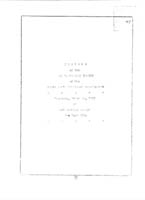Table of Contents
Appendix 19a
Meeting of the War Historical Bureau of
the Young Men's Christian Association
25 March 1920
 The International Committee of the North American Young Men's Christian Association sought to establish a record of the Association's
war work efforts during the First World War. Its achievements were summarized in the YMCA's publication of Service with Fighting Men, a
two-volume overview published in 1922 by the Association Press. The American YMCA established a War Historical Bureau to collect information
in preparation for the set and conducted an oral history of War Prisoners' Aid (WPA) operations on 25 March 1920 at the organization's New York headquarters on Madison Avenue.
Mr. Harris, Senior Secretary of the War Historical Bureau, chaired the interview, with the assistance of Mr. Morse, Associate Secretary
for the bureau. Participating in the discussions were C.V. Hibbard, one of the founders of WPA work in Europe; Robert L.
Ewing, Senior American War Prisoners' Aid Secretary in England; Mr. Newell, American WPA Secretary in England; Amos Ebersoll, American
WPA Secretary in Austria-Hungary; Dr. Julius Hecker, American WPA Secretary in Austria-Hungary; and Lewis A. Dunn, American WPA Secretary
in Germany.1
The International Committee of the North American Young Men's Christian Association sought to establish a record of the Association's
war work efforts during the First World War. Its achievements were summarized in the YMCA's publication of Service with Fighting Men, a
two-volume overview published in 1922 by the Association Press. The American YMCA established a War Historical Bureau to collect information
in preparation for the set and conducted an oral history of War Prisoners' Aid (WPA) operations on 25 March 1920 at the organization's New York headquarters on Madison Avenue.
Mr. Harris, Senior Secretary of the War Historical Bureau, chaired the interview, with the assistance of Mr. Morse, Associate Secretary
for the bureau. Participating in the discussions were C.V. Hibbard, one of the founders of WPA work in Europe; Robert L.
Ewing, Senior American War Prisoners' Aid Secretary in England; Mr. Newell, American WPA Secretary in England; Amos Ebersoll, American
WPA Secretary in Austria-Hungary; Dr. Julius Hecker, American WPA Secretary in Austria-Hungary; and Lewis A. Dunn, American WPA Secretary
in Germany.1
During the interview, the secretaries addressed a wide range of questions regarding the Association's War Prisoners' Aid work: reasons for the establishment of POW assistance; the source of funding for WPA operations; the role of the World's Alliance in POW relief; the role of national YMCA's in supporting war prisoner aid; Red Triangle work in neutral countries; aid for civilians in internment camps; the Association's impact on war prisoner nutrition and parcel distribution; the impact of traveling WPA secretaries and the development of POW Associations; relations with the International and national Red Cross Societies; types of WPA services; and the living conditions in prison camps. This oral history is very interesting not only in terms of the insights provided by some of the practitioners in WPA service, but in some of the misconceptions and inaccuracies which emerge during the discussions. These secretaries provide individual perspectives, but they also acknowledge that there is no general history of the YMCA's prisoner of war policies and activities. This oral history reflects the secretaries' pride in their work for prisoners of war, accomplished with limited resources.
Notes:
Note 1: Prisoner of War Work Special File. Meeting of the War Historical Bureau of the Young Men's Christian Association: Thursday, March 25, 1920 at 347 Madison Avenue, New York City, 25 March 1920. Armed Services Records Box 52. Folder: "Prisoners of War Work-General-1915-1920." Kautz Family YMCA Archives, University of Minnesota, Minneapolis, MN. back